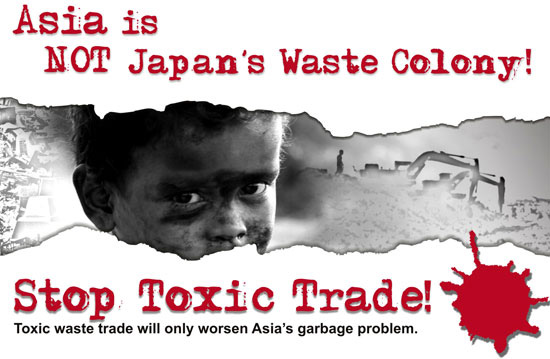Civil Society Letter to His Excellency Prime Minister Shinzo Abe Calling for the Removal of Toxic Waste and Other Exploitative Provisions in the Various Japanese Economic Partnership Agreements

To His Excellency Prime Minister Shinzo Abe,
On May 3, Japan will celebrate Kenpo Kinenbi (Constitution Day), commemorating the 1947 enactment of the Constitution of Japan. It is a day of reflection for the nation as it transitioned from the old Meiji Constitution to the present constitution. May 3 also serves as a day of renewal for Japan, as the passage of its fundamental law was the first step towards becoming part of the community of peaceful nations once again.
We, the undersigned civil society organizations from various nations around the world, call upon the present leadership of Japan to remind them of the obligation Japan undertook in its Nihon-koku Kenpō (Constitution of Japan). In particular, Art. 98(2) of Japan’s Constitution, which states that “treaties concluded by Japan and established laws of nations shall be faithfully observed.”
Art. 98(2) appears to have been placed by the wayside in Japan’s relentless pursuit of bilateral Economic Partnership Agreements in Asia. At the center of this controversy is Japan’s insistence on imposing preferential tariff treatment on toxic wastes, and other globally banned substances and materials in the various Economic Partnership Agreements that Japan has entered into with Singapore, Malaysia, the Philippines and Thailand. This has the effect of violating Japan’s obligations under the Basel Convention, to which it is a party to, and several multilateral environmental agreements (MEAs).
Civil society groups from all over the world have expressed grave concern over these bilateral pacts, particularly on how these will facilitate trade in toxic wastes, and the consequent environmental and social injustice that will brought upon by Japanese toxic wastes onto its Asian bilateral partners.
The official response that Japan has given to placate the fears of civil society is that any toxic waste export from Japan will comply with the Basel Convention and with the domestic laws of the relevant country. This response, we feel, is both disingenuous and falls short of the Japanese constitutional requirement of “faithful observance” of treaties.
Japan appears to have forgotten that other obligations exist under the Basel Convention that demands Japan to prevent and minimize toxic waste generation and export from the start, such as:
- Arts. 4.2.b, d, and e – By creating incentives, such 0 tariffs for toxic wastes, for trade from Japan to the Philippines and other Asian countries, Japan is violating its obligation to dispose of the toxic waste it generates within its own borders by creating the market environment to facilitate the export of the toxic wastes. It also ensures that the transboundary movement of toxic wastes from Japan to other developing countries in Asia increases, thus, violating the obligation to minimize the transboundary movement of hazardous wastes.
- Art. 4.10 – By promoting the transfer of its toxic wastes to its Asian neighbors through the opening of trade routes and creating the market environment for toxic waste trade, Japan is passing on the responsibility to manage the toxic waste it generated to its bilateral Party. Under Art. 4.10 of the Basel Convention, Japan cannot pass on this responsibility to the importing or transit country.
- Art. 11 - The Basel Convention allows Parties to enter into bilateral, multilateral or regional agreements or arrangements provided that such agreement or arrangement do not derogate from the environmentally sound management of hazardous wastes as required by this Convention, and for these agreements or arrangements to stipulate provisions which are not less environmentally sound than those provided for by this Convention. By redefining “wastes” as “goods” in its bilateral agreements, Japan instantly undermined the controls established under Basel which hinge upon objects or materials that are considered “wastes” subject to global controls distinct from free trade considerations.
There can be no faithful observance of the Basel Convention, if Japan chooses to ignore these obligations. Japan’s obligations under the Basel Convention are without reservations and exceptions, it is thus duty bound to observe ALL of Basel’s obligations.
There is palpable fear among communities around Asia that waste colonies will be established by Japan through its bilateral treaties in Asia. It would be prudent for Japan’s present leadership to pause and address the concerns civil society is raising against the various Japan Economic Partnership Agreements.
The Nihon-koku Kenpō was born out of the difficult period in Japan’s history and that of Asia’s, and was an instrument designed to heal wounds and allay fears. Sixty years after the historic enactment of the Constitution, Japan is pushing bilateral agreements that not only disregard its long-standing commitment of faithful observance, but one that threatens to dig deep into the old wounds.
In the spirit of Kenpo Kinenbi, we strongly suggest the following actions be taken:
- Japan, the Philippines, Thailand and other Asian governments must eliminate all listings of toxic wastes, toxic technology, and internationally controlled or banned substances, and correct other exploitative provisions in their respective Economic Partnership Agreements.
- Japan must ratify the Basel Convention’s Ban Amendment at the earliest possible date and encourage the Philippines, Thailand and other Asian nations to do the same.
- A full and impartial multi-stakeholder inquiry in both Japan and the Philippines must be made to determine the intent and manner of how the waste trade liberalization provisions were included in the Japan-Philippine Economic Partnership Agreements, and to hold these officials accountable.
- Japan and its bilateral counterparts in Asia must embark on a serious program to prevent hazardous and other wastes at source via toxics use reductions, stopping planned obsolescence, and holding manufacturers accountable for the products they produce, rather than seeking hiding places for wastes.
For the sanctity of life and the preservation of our environment, we sign this urgent petition in observance of the first Global Day of Action against Japanese Waste Colonialism.
|